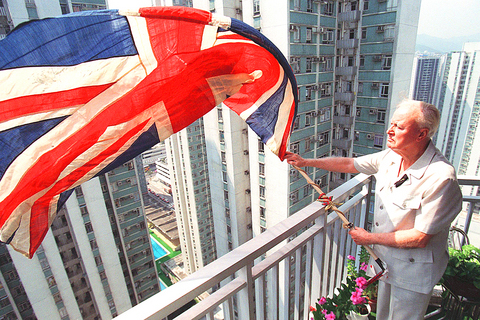Jack Edwards, a British World War II prisoner of war (POW) who dedicated his life to tracking down Japanese war criminals and defending the rights of veterans, has died at the age of 86.
Edwards, who spent four years in Japanese prisoner of war camps -- initially in Singapore's notorious Changi prison and then a camp in Chinguashi (
A spokeswoman for the Hong Kong and China branch of the Royal British Legion (RBL) said yesterday that Edwards had died in Prince of Wales hospital, a former British army treatment center, after battling the after-effects of a stroke suffered five years ago.

PHOTO: AFP
Doctors had yet to indicate the exact cause of death, she added.
The president of the legion branch, Brigadier Christopher Hammerbeck, hailed Edwards.
"The Hong Kong and China RBL deeply regret the passing of Jack Edwards, a man who made a major contribution to the legion and to the wellbeing of Hong Kong's war veterans and particularly their widows," Hammerbeck said.
"He was not only a leading figure locally but also internationally within the legion and the British Commonwealth Ex-Servicemen's League, whose conferences he attended until illness prevented him from doing so," he added.
Edwards' career as a soldier was cut short when he was captured by Japanese troops while defending Singapore in 1942 after serving in the doomed Battle of Malaya.
Taiwan camp
He won his freedom when US troops liberated Taiwan, then called Formosa, where he had been held as a slave laborer in the the Kinkaseki POW camp in the town of Chinguashi during the latter years of World War II.
Prisoners at the camp worked under brutal conditions at a copper mine. They endured malnutrition and were subject to frequent beatings by guards. Many died.
Edwards detailed the horrors of his time at the Kinkaseki camp in Chinguashi in his book, Banzai You Bastards.
Following a brief spell in his native Wales after the end of the war, he returned to Chinguashi in 1946, as part of a team that was investigating war crimes to help track down and prosecute Japanese war criminals.
Edwards returned to Taiwan several times, and in 1997 led a tour of the site of the camp and mine in Chinguashi. The success of the event helped lead to the establishment of an annual POW memorial event in Chinguashi.
Edwards never fought in Hong Kong but it was here that he made his greatest post-war achievements, most notably winning Hong Kong's war widows the right to British passports when the territory's sovereignty switched to China in 1997.
In recognition of his efforts, Edwards was informed of the decision in person by the then British prime minister John Major at Government House, which was the official residence of the colonial government.
Honors
Decorated with military and civilian Member of the British Empire honors, Edwards' efforts extended across the Asia-Pacific region, where he badgered governments for the establishment of shrines to fallen Allied soldiers.
The RBL is planning a commemoration for Edwards following a funeral at the Anglican cathedral in Hong Kong.

A preclearance service to facilitate entry for people traveling to select airports in Japan would be available from Thursday next week to Feb. 25 at Taiwan Taoyuan International Airport, Taoyuan International Airport Corp (TIAC) said on Tuesday. The service was first made available to Taiwanese travelers throughout the winter vacation of 2024 and during the Lunar New Year holiday. In addition to flights to the Japanese cities of Hakodate, Asahikawa, Akita, Sendai, Niigata, Okayama, Takamatsu, Kumamoto and Kagoshima, the service would be available to travelers to Kobe and Oita. The service can be accessed by passengers of 15 flight routes operated by

Alain Robert, known as the "French Spider-Man," praised Alex Honnold as exceptionally well-prepared after the US climber completed a free solo ascent of Taipei 101 yesterday. Robert said Honnold's ascent of the 508m-tall skyscraper in just more than one-and-a-half hours without using safety ropes or equipment was a remarkable achievement. "This is my life," he said in an interview conducted in French, adding that he liked the feeling of being "on the edge of danger." The 63-year-old Frenchman climbed Taipei 101 using ropes in December 2004, taking about four hours to reach the top. On a one-to-10 scale of difficulty, Robert said Taipei 101

Taiwanese and US defense groups are collaborating to introduce deployable, semi-autonomous manufacturing systems for drones and components in a boost to the nation’s supply chain resilience. Taiwan’s G-Tech Optroelectronics Corp subsidiary GTOC and the US’ Aerkomm Inc on Friday announced an agreement with fellow US-based Firestorm Lab to adopt the latter’s xCell, a technology featuring 3D printers fitted in 6.1m container units. The systems enable aerial platforms and parts to be produced in high volumes from dispersed nodes capable of rapid redeployment, to minimize the risk of enemy strikes and to meet field requirements, they said. Firestorm chief technology officer Ian Muceus said

MORE FALL: An investigation into one of Xi’s key cronies, part of a broader ‘anti-corruption’ drive, indicates that he might have a deep distrust in the military, an expert said China’s latest military purge underscores systemic risks in its shift from collective leadership to sole rule under Chinese President Xi Jinping (習近平), and could disrupt its chain of command and military capabilities, a national security official said yesterday. If decisionmaking within the Chinese Communist Party has become “irrational” under one-man rule, the Taiwan Strait and the regional situation must be approached with extreme caution, given unforeseen risks, they added. The anonymous official made the remarks as China’s Central Military Commission Vice Chairman Zhang Youxia (張又俠) and Joint Staff Department Chief of Staff Liu Zhenli (劉振立) were reportedly being investigated for suspected “serious